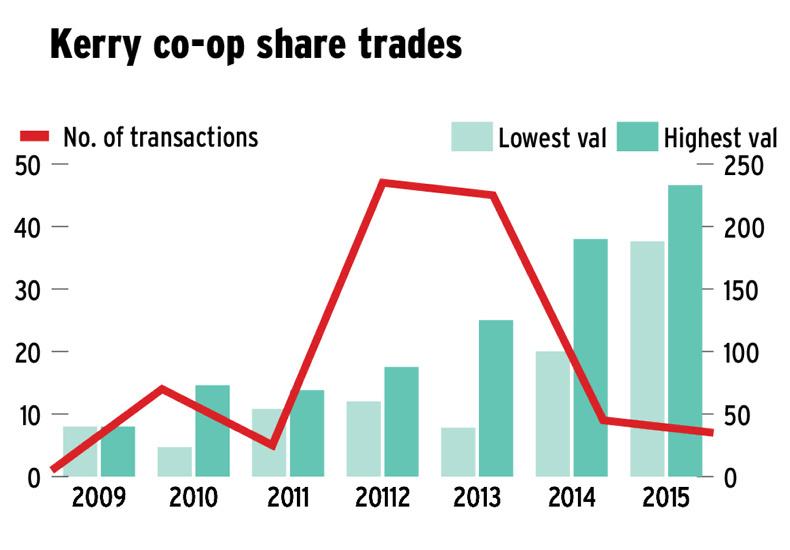
LOYALTY CODE:
The paper code cannot be redeemed when browsing in private/incognito mode. Please go to a normal browser window and enter the code there

LOYALTY CODE:
The paper code cannot be redeemed when browsing in private/incognito mode. Please go to a normal browser window and enter the code there
This content is copyright protected!
However, if you would like to share the information in this article, you may use the headline, summary and link below:
Title: Only 128 share sales over seven years
From December 2009 to October 2015, a total of 128 co-op share sales were reported to Revenue.
https://www.farmersjournal.ie/only-128-share-sales-over-seven-years-246192

ENTER YOUR LOYALTY CODE:
The reader loyalty code gives you full access to the site from when you enter it until the following Wednesday at 9pm. Find your unique code on the back page of Irish Country Living every week.

CODE ACCEPTED

You have full access to farmersjournal.ie on this browser until 9pm next Wednesday. Thank you for buying the paper and using the code.

CODE NOT VALID
Please try again or contact us.
For assistance, call 01 4199525
or email subs@farmersjournal.ie
Sign in

Incorrect details
Please try again or reset password
If would like to speak to a member of
our team, please call us on 01-4199525
Reset
password
Please enter your email address and we
will send you a link to reset your password

If would like to speak to a member of
our team, please call us on 01-4199525
Link sent to
your email
address
![]()
We have sent an email to your address.
Please click on the link in this email to reset
your password. If you can't find it in your inbox,
please check your spam folder. If you can't
find the email, please call us on 01-4199525.
![]()
Email address
not recognised
There is no subscription associated with this email
address. To read our subscriber-only content.
please subscribe or use the reader loyalty code.
If would like to speak to a member of
our team, please call us on 01-4199525
 This is a subscriber-only article
This is a subscriber-only article
Update Success !
Revenue is basing its valuation of the co-op shares purchased through the patronage scheme on a tiny volume of traded shares.
Every transaction on the internal “grey” co-op trading market is listed in the information circulated within Revenue in recent months.
In 2011, only five of the 13,000 Kerry Co-op shareholders traded shares according to Revenue records. On the basis of this handful of trades, Revenue placed a value of €65 on each co-op share, and wants any co-op shareholder who bought shares through the patronage scheme in that year to pay tax on the shares purchased as if they were income. This would leave any milk producer in the higher tax bracket paying €30/share purchased.
A farmer buying 100 shares at €2 apiece would therefore have a tax liability of €3,000.
Listen to a discussion of the Revenue's Kerry co-op project in our podcast below:
Listen to "Inside the Revenue's Kerry co-op project" on Spreaker.
Trading did increase in 2012 and 2013, but the total number of trades in each year was less than 50 – still less than one half of 1% of the co-op’s shareholder register. In other words, only one in 250 people who owned co-op shares traded some or all of their shares.
With the 3,400 milk producers only accounting for 25% of the co-op’s 13,000 shareholders, it is reasonable to assume that the majority of shares traded were by non-participants in the patronage scheme. Indeed, “dry” shareholders – non-active milk suppliers – have far less reason to hold on to shares and maintain membership and voting rights in their co-op than milk suppliers, so it is reasonable to assume that even less than one-quarter of the share trades involved patronage share participants.
Grey market
Trading of shares in Kerry Co-op is allowed, but only with the approval of the co-op board. The value of the shares traded is agreed in each case between vendor and purchaser, without the knowledge or involvement of the board.
The value of the shares is included for each transaction in the information circulated within Revenue, but not the volume of shares traded.

Exposed: Revenue’s Kerry co-op project
3,500 Kerry suppliers to get tax bills this year
Only 128 share sales over seven years
The people at the centre of Kerry shares project
More than €400,000 in tax already recouped from Kerry Co-op shareholders
Revenue knew Kerry suppliers were 'broke' as it sent tax claims
Kerry case leads to Revenue staff manual revision
Revenue may target 2013 Kerry spin-out
Revenue to use UK case law to defend Kerry tax approach
Full coverage: the Revenue's Kerry co-op project
SHARING OPTIONS: